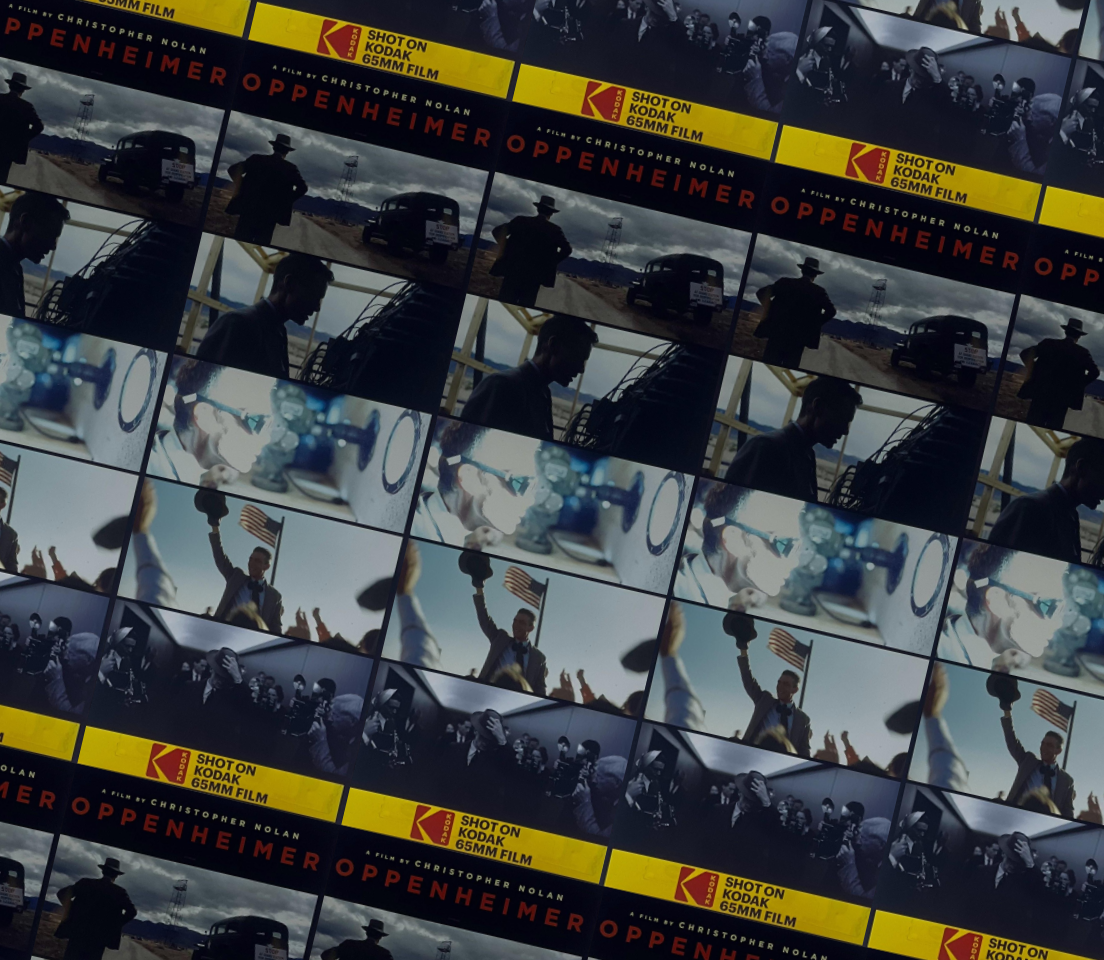‘Oppenheimer’ Isn’t a Biopic, It’s a Political Commentary
An “Oppenheimer” film reel captures many of the movie’s most dramatic moments.
Fission and fusion: The opening of Christopher Nolan’s latest masterpiece, “Oppenheimer,” coyly captions itself with the very concepts that define its plot and propelled the scientific discovery J. Robert Oppenheimer was most famous for.
On the one hand, Oppenheimer’s infamous creation—the atomic bomb—was made possible only by the discovery of nuclear fission, and later weapons by the discovery of nuclear fusion. On the other hand, Nolan tells the story of Oppenheimer’s life by breaking it apart and piecing it back together, fissioning and fusing the character—much like the very atoms of the bombs he created—until it is not clear where Oppenheimer’s world ends and the audience’s begins.
Jumping off of the discovery of nuclear fission, the movie dives into a saga of nail-biting action, nuclear politics, and political feuding. “Oppenheimer” doesn’t simply tell the story of a man’s life but uses it as a vessel to bring the audience to the same conclusion its titular character eventually comes to himself: Atomic weapons have left the world forever changed.
It’s in this sense that “Oppenheimer” isn’t merely a biopic or a blockbuster, but a political commentary. It implores the audience to challenge their own perceptions of nuclear weapons, and in doing so, confronts a long-built-up sense of apathy. In almost every scene, the film seems determined to answer in the affirmative the question that Upper School history teacher Matt June asked: “Is this going to make people start to care about nuclear weapons again?”
This motive is driven home by intermingling four timelines: the Manhattan Project and its mad dash to create atomic weapons, a meeting of the Atomic Energy Commission shortly after the first Russian nuclear weapons test, Oppenheimer fighting to retain his security clearance under accusations of being a communist, and U.S. Secretary of Commerce nominee Lewis Strauss’s Senate confirmation hearing.
In classic Christopher Nolan fashion, these plotlines are wound together in a stunningly non-linear fashion, with jumps that are both jarring and ingeniously thought through. The contrast of these timelines puts at center stage a moral reckoning that takes place in Oppenheimer’s mind as he tries to work through the sheer destructive ability of the weapon he created. It is here that the comparison of Oppenheimer to Prometheus, made at the start of the movie, becomes most apt.
The film’s opening credits put it best: “Prometheus stole fire from the gods and gave it to man. For this he was chained to a rock and tortured for eternity.” In fact, the biography of Oppenheimer that the movie was based on is titled “American Prometheus.” This name references the monumental power of Oppenheimer’s discoveries and the massive destruction they created, but also hints at one more truth: Oppenheimer suffered for creating the atomic bomb.
This deadly tension comes to a head in Nolan’s spell-binding recreation of the Trinity Test, the codename for the first detonation of nuclear weapons. This event, captured without the use of computer-generated imagery, slows the racing movie perfectly through its stunning suspense. Although the film’s portrayal neglects to discuss the effects of the test (and of the entire Manhattan Project) on local communities, the moment demonstrates the answer to the question scientists had been focusing on for years: As US physics teacher Josh Phipps said, “What do you have to do to ensure that this chain reaction [sustained nuclear fission] will happen?”
In a sense, the test was a huge success. US history teacher Debbie Linder said, “For all scientists, there is a race: If you don’t do it, somebody else will.” For many Manhattan Project personnel, Trinity meant that they had won that race.
However, the moment wasn’t all victory. As Oppenheimer famously recounted, “We knew the world would not be the same. A few people laughed, a few people cried. Most people were silent. I remembered the line from the Hindu scripture, the ‘Bhagavad Gita.’ Vishnu is trying to persuade the Prince that he should do his duty and, to impress him, he takes on his multi-armed form and says, ‘Now, I am become Death, the destroyer of worlds.’”
The beauty of Nolan’s recreation of this moment boils down to a line spoken by Matt Damon’s character, General Leslie Groves, early in the movie: “This is the most important thing to ever happen in the history of the world.” As the film’s suspense-ridden lead-up to the test unfolds, it isn’t hard to feel like he’s right.
However, even better than its Trinity portrayal is what the movie does next. In one plotline, viewers see the story of a martyr: Oppenheimer, around a decade after Trinity, attacked for his arms-control advocacy and for advising against the development of hydrogen bombs. In another, they see Lewis Strauss in his 1959 Senate confirmation hearing and slowly learn that it was Strauss’s own personal vindictiveness that led to the attack on Oppenheimer. This set-up gives Nolan the platform for the political point he has spent the entire movie building toward, and in doing so, allows him to cement “Oppenheimer” as one of the most important films in recent memory.
For one, it’s in this setting of nuclear politics that viewers begin to understand how much has changed from the world before atomic weapons to the witch-hunting one Oppenheimer finds himself in. All of this contrast builds to a single theme. As US history teacher Ernesto Cruz said, “We’re living in the world created by [the nuclear politics of the 1940s and 50s.]” To make this point, there’s one more step the movie must take: tying itself back into a 21st century world.
To finally bridge Oppenheimer’s world and the audience’s, Nolan closes the film with images of modern nuclear weapons. His message is clear—not only can these weapons be compared to the gift of fire from Prometheus, and not only did they give humanity the power to annihilate itself, but, as Oppenheimer expresses to Albert Einstein in the movie’s final scene, they “start[ed] a chain reaction that [will] destroy the entire world.”

Scarlet Gitelson (‘26) is delighted to be serving as one of this year’s Editors-in-Chief. Using her writing, she seeks to promote connection and discourse...





















































Deborah Linder • Sep 18, 2023 at 12:47 pm
Great work on this article.